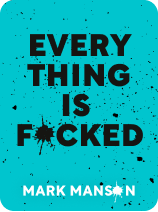

This article is an excerpt from the Shortform book guide to "Everything Is F*cked" by Mark Manson. Shortform has the world's best summaries and analyses of books you should be reading.
Like this article? Sign up for a free trial here.
What’s Mark Manson’s philosophy of life? How does he say we can live a more meaningful existence?
Mark Manson is an accomplished author of self-help books that delve into personal development and philosophy. In his book Everything Is F*cked, he explores his own life philosophy, arguing that it’s better to live for the present moment and to help yourself and others to feel fulfilled.
Keep reading to learn about Mark Manson’s life philosophy, according to his book Everything Is F*cked.
Mark Manson: The Philosophy of a Meaningful Life
Mark Manson’s philosophy of a meaningful life and how to live without relying on hope for a better future is the main theme of his book Everything Is F*cked. In the book, he grapples with the following predicament: If we need hope to cope with the pain of existence but hope inevitably causes us to suffer and to force other people to suffer, what’s left for us to do?
We’ll explain Mark Manson’s life philosophy, according to the descriptions in Everything Is F*cked.
Living Without Hope
In Everything Is F*cked, Mark Manson explores a philosophy of existence where the only moral way to live is to return to a life without hope—that is, to pursue a life of pain without expecting it to result in a less painful future. Instead of finding meaning by trying to bring about a more pleasant future, you can find meaning by having a positive impact right now.
But how do you define a “positive impact”? Manson acknowledges that this “hopeless” worldview is an ideology, like the others, in the sense that it has a primary virtue: meaningful human life. He argues that this is the only primary virtue that doesn’t require you to cause suffering to attain it. At every second of the day, work to help yourself and all others 1) live a meaningful life and 2) protect everyone’s ability to live a meaningful life.
Living for the Moment
Mark Manson’s philosophy is unique compared to hope-based ideologies in that it involves living for the present moment. Instead of working toward a better future, strive to immediately make someone’s life better at all times. Manson acknowledges that such a life is rarely painless, but it always feels meaningful.
| Live in the Moment, Plan for the Future In How to Live, Derek Sivers (Anything You Want) argues that while it’s important to live in the moment, there are many benefits to living for the future, as well. Many of the most effective ways you can help others live meaningful lives have no immediate positive impact. In these pursuits, have hope that your actions now will pay off in the long term (contrary to Manson’s argument). For example, practicing a skill like drawing won’t do much good for others when you’re first learning, but after you’ve practiced for 10 years, you’ll be able to create art that powerfully enriches others’ lives. Similarly, if you want to save money for your children to go to college, you should invest your savings now and avoid touching them for years. Conversely, Sivers asserts that too often, we treat the future like a garbage dump, pushing our problems forward in time instead of solving them now. Doing this does direct harm to the meaningful lives of the next generation—including your children. Sivers offers practical suggestions to help you consider the future. First, put a picture of your face and the faces of your loved ones through an age progression filter and keep these photos somewhere you can see them often. This will motivate you to take care of those people, who won’t exist for many years. Additionally, for every choice you make, imagine what your life would be like if you repeated that choice forever. Every choice you make helps build a habit, and you want those habits to have good consequences down the line. |
How to Practice a Life Without Hope
In explaining his philosophy, Mark Manson recommends following one rule in order to live a life without hope: Never use a human (including yourself) solely as a means to some other goal. This means that under no circumstances is it justified to sacrifice someone else’s ability to live a meaningful life. For example, you could morally campaign to get a responsible political figure into office, but you could never morally assassinate a cruel political dictator to do so—this would be using that dictator’s human life as a means to achieve your political goal.
Mark Manson asserts that this life philosophy will also radically improve your relationship with yourself. When you treat your meaningful life as your primary virtue, you take care of yourself—for instance, by exercising, eating well, and getting enough sleep—not because you hope it’ll help you feel pleasure later, but because you know it’s good for you now. In contrast, doing hard drugs and degrading your body for pleasure is immoral because you’re abusing your body as a means to experience pleasure.
| Mark Manson’s Philosophy Is Paradoxical You could argue that Mark Manson’s philosophy is self-contradictory. This philosophy is a deontological theory—in other words, it argues that certain actions are inherently right and some are inherently wrong, no matter what context there is to justify those actions. As a deontological theory, Manson’s philosophy is subject to the paradox of deontology, which points out that sometimes, it’s impossible to do something morally right without doing something morally wrong. For example, imagine you see someone with a gun about to shoot into a crowd, and you realize you need to quickly incapacitate them to protect the crowd’s meaningful lives. However, hurting the armed shooter would be using that person’s meaningful life to accomplish some other goal—would Manson say this is immoral? This paradox equally applies to your relationship with yourself. Sometimes, it’s necessary to harm or sacrifice yourself to protect the meaningful life of others. Pushing your child out of the way of a moving car is risking your meaningful life in service of another goal—would Manson say this is immoral? However, the alternative consequentialist theories, which hold that actions are morally right or wrong depending on how good their end result is, have their own flaws. As Manson has described, the excuse of sacrificing yourself or others for some “greater good” can justify actions that cause extreme suffering. These are questions with no easy answers. |
A Future Without Hope
As Mark Manson explores his life philosophy, he acknowledges that humanity will never unanimously embrace this “hopeless” mindset, and thus, we won’t be able to stop the conflict and violence currently plaguing the world. Humanity as a whole is addicted to hoping for a better future, and it’s willing to destroy itself to do so. This hope-fueled destruction takes place on every scale: countries going to war, cities failing to take care of their citizens, and family members abusing one another.
Ultimately, Manson argues that there’s only one potential solution to this problem: We must wait until artificial intelligence (AI) gains supreme control over the world. While this sounds ridiculous at first, Manson insists that once artificial intelligence is advanced enough, it will gain the ability to improve itself by creating better artificial intelligence. At this point, AI will reach a level of intelligence we can’t comprehend: It will understand the universe at such a deep level that it will be able to mold it into whatever shape it decides to.
Manson is optimistic that an AI-controlled world would be ideal for us. Humanity is so bad at governing itself that machines would almost certainly do a better job. Manson anticipates that artificial intelligence will dramatically transform our world into an unrecognizable form and that, afterward, we’ll be better off.
Even if artificial intelligence is our only hope as a species, we don’t need to worry about it. As we’ve established, you have all the tools you need to live a meaningful life without regard for the future at all. Simply live for the moment, fulfilled by the constant pursuit of the preservation of meaningful human life.
| Manson Is a Dataist, Others Are Techno-Humanists In Homo Deus, Yuval Noah Harari also considers the possibility that artificial intelligence will evolve to the point that it controls our lives. He explains that the philosophy that supports this vision of the future—the philosophy Mark Manson asserts here—is called “Dataism,” as its highest value is the ability to process data and use that data to transform the world. This view holds that humans are valuable because they’re complex data processors, but eventually, it would be best to step aside and allow more powerful data processors—artificial intelligence—to shape the universe. Harari also describes an alternative philosophy to Dataism that could also steer the future of humanity, known as techno-humanism. Rather than allow AI to control the world, techno-humanists want to use technology to enhance human biology and help us better run the world. Although Manson would likely argue that techno-humanism would just give fallible humans more power to abuse, it’s possible that technological enhancements would help us circumvent the problems with hope that Manson describes in his book. For example, if you were to use technology to enhance your consciousness enough to predict the future in significant detail, it’s possible that you could avoid being deluded by false hopes and make wiser decisions. |

———End of Preview———
Like what you just read? Read the rest of the world's best book summary and analysis of Mark Manson's "Everything Is F*cked" at Shortform.
Here's what you'll find in our full Everything Is F*cked summary:
- How the hopelessness epidemic is affecting society
- Why you must abandon hope in order to live a fulfilling life
- How to practice a life without hope and instead, find meaning






